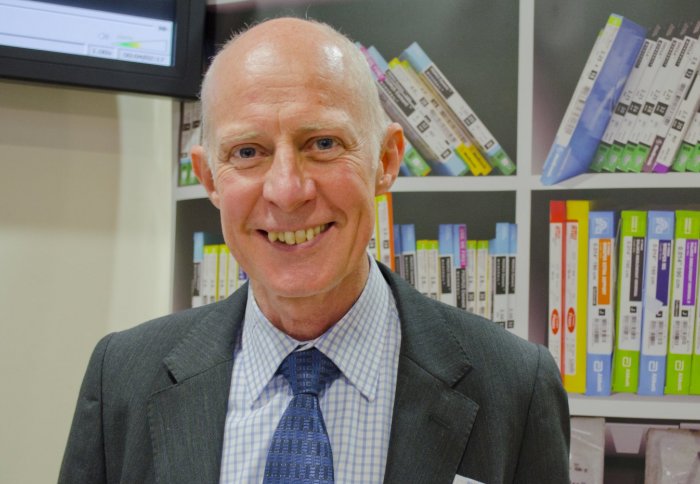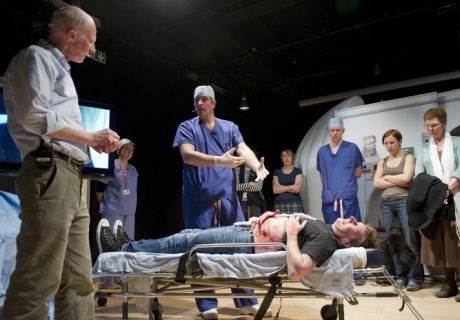Professor Kneebone on his Wellcome Trust Engagement Fellowship

Professor Roger Kneebone talks about his Wellcome Trust Engagement Fellowship, which he officially took up this month.
The start of this month marked the official start of Professor Roger Kneebone’s Wellcome Trust Engagement Fellowship, alongside a Wellcome Trust Society Award. This will see him spend the next two years working to bring together his passions for medicine, the arts and education to spark inspiration within the general public.
Now in its second year, the scheme provides support for science communicators with a strong track record of delivering high-quality public engagement and aims to propel them to become leaders in their field. Here Roger speaks to Al McCartney about his grand plans.
Could you tell me a little about the two awards that you have received from the Wellcome Trust, and what they will help you achieve?
I’ll be posting updates on Twitter - you can follow me at @ProfKneebone
– Professor Roger Kneebone
The Wellcome Trust Engagement Fellowship is a two year personal award which will support me in developing as a leader in the field of public engagement. The Fellowships provide successful applicants with time and space to develop their ideas, and full access to the extraordinary resources of the Wellcome Trust. This is a unique opportunity to develop ideas and explore new directions.
The Wellcome Trust Society Award builds on my group’s current work using simulation (of surgical procedures). It is funding a collaborative group of colleagues within and beyond Imperial to present the worlds of biomedical science and clinical practice at four major Festivals over the next two years. By showcasing our work at the Big Bang Science Fair for children and young people, the four Cheltenham Festivals (literature, jazz, science and classical music) and the Green Man Music Festival, we aim to reach a wide range of people.
My grand plan is to develop public engagement as a means of bringing clinicians, scientists and publics together to share their perspectives in a process of ‘reciprocal illumination’. I see public engagement as a crucial aspect of research, acting as a translational bridge which can shed new light on important issues and challenge how our scientists and clinicians think.
This fellowship will allow for so many possibilities - what excites you the most at this stage?
I’m especially excited at the prospect of working with the Wellcome Trust. This extraordinary organisation has a unique vision. It supports highly imaginative work which crosses boundaries between clinical medicine, biomedical science, art, performance and history.
I believe passionately in bringing different perspectives together and working with experts outside medicine. This will be a tremendous opportunity to work with craftsmen, artists and performers as well as some of the most eminent scientists and clinicians in their fields.

Professor Kneebone and his team simulating emergency cardiovascular surgery
How important do you think it is to encourage engagement between the general public and the field of biomedical science, and what are the greatest challenges in doing so?
I think it is absolutely essential. The world of medicine concerns us all, and we have a responsibility as citizens to be involved in decisions about how it develops. But it can also affect us (or our families or friends) at any time if we get ill.
But there are many people who don’t come to science fairs and exhibitions and we’re aiming to reach a very wide range of people, across all ages and backgrounds. We’re hoping to develop ways of taking public engagement to them, and to work with schools and communities to explore new ways of involving people. Working out how to reach them all will be part of the project!
In what ways do you think that your work like yours can really benefit people’s lives?
Biomedical research is full of incredibly exciting developments at the moment, especially at Imperial. New breakthroughs are around the corner, with huge potential to change people’s lives. But many people are unaware of these developments, and I’m hoping to develop ways to connect and discuss.
Which do you think are the best examples of inspiring people to learn more about, and even become involved with, science?
I think the most effective examples are where scientists and publics share ideas with one another. Approaches that combine live performance, film, TV, video and other media are raising new vistas of possibility. I’m hoping to draw on the best of these while developing my own ideas and those of my colleagues.
You have already said that you intend to study the success of your engagement activities in a far more critical way that has been done before – why is there a need for this?
We’ve got a fantastic opportunity to explore different approaches through a series of high profile events. In the next two year we’re going to test out a range of ideas, using rigorous evaluation to test what works well and what needs to be changed.
How can people find out about your work and follow your progress over the next two years?
I’ll be posting updates on Twitter (follow me at @ProfKneebone) and hope to have a blog up and running in the not too distant future.
Article supporters
Article text (excluding photos or graphics) © Imperial College London.
Photos and graphics subject to third party copyright used with permission or © Imperial College London.
Reporter
Mr Al McCartney
Faculty of Medicine Centre